Macro-Finance Salon (No. 160): Developing Green Finance to Boost Carbon Neutrality
2021-05-01 IMI
On April 17, the Macro-Finance Salon (No. 160) was held online, which was the third session under the series of “Learn from the spirit of the Two Sessions--finance supports the start of the 14th Five-Year Plan”. Lan Hong, deputy director of the Ecological Financial Research Center and professor of School of Environment, RUC, delivered a keynote presentation entitled Developing Green Finance to Boost Carbon Neutrality. Chen Shiyi, standing vice president of Anhui University, Guo Jianwei, editor-in-chief of China Financial Publishing House, Mei Dewen, president of Beijing Environment Exchange, Sun Mingchun, chief economist of Haitong International Securities Group Limited, and Yin Hong, associate dean of Modern Finance Research Institute of ICBC, made comments on the presentation. The salon was chaired by Zhang Jie, director of IMI.
In the keynote presentation, Prof. Lan illustrated four parts: climate governance and economic development, carbon emissions in China, the significance of green finance to environmental projects, and using carbon neutrality to drive the economy.
The main ideas are as follows:
First, with regard to climate governance and economic development, Prof. Lan argued that global climate change has been a great challenge for the sustainable development of human beings. It is a public good in itself and thus should be dealt with by public finance. However, as current international organizations lack public finance services, green finance is needed to boost overall governance for global climate change.
Second, that the industrial sector is a major source for carbon emissions in China makes it more difficult to reduce carbon emissions. As fossil energy is in shortage, solving energy crisis and climate change issues are closely related. Sustainable economic development cannot be made possible without a new energy system. Hence, China urgently needs green finance for energy transformation and climate change governance.
Third, when it comes to environmental projects, Prof. Lan stated that they have long payback periods and little collateral for loans and are often underfunded, so they need to be funded by green project financing, green financial leasing, green asset securitization, carbon fund and other approaches. In addition, as public green projects can be monopolistic, finance is needed to manage risks in technology development while ensuring profitability.
Fourth, Prof. Lan held that building regimes is the key to future development. She took Europe and the US as examples, arguing that China should carefully design macro regimes and frameworks for green finance. Policy and market systems are devised under those regimes to enable carbon neutrality to become a new driver of economic development.
By analyzing and measuring carbon emission targets, vice president Mr. Chen proposed his ideas about transformation to lower-carbon energy mix and greener economic structure in the future. Mr. Guo shared the following opinions about the theme. First, as emissions are mobile and cannot be kept out of borders, more fields have to get involved to achieve carbon neutrality. It is necessary to engage all financial institutions to develop co-governance of green finance. Second, carbon neutrality is a public product and the government should be part of it through financial means. The government should also find ways to internalize externalities. Therefore, to accomplish 30-60 targets in theory and in policy, green finance and other financial means are required for effective cooperation. Third, based on Prof. Lan’s presentation, Mr. Guo reflected upon approaches and frameworks for carbon neutrality and proposed three development pathways. As regards to the theme, Mr. Mei analyzed the unprecedented challenge, the rare opportunity and the approach -- carbon finance. As someone who knows investment banking and is a market participant, Mr. Sun illustrated the significance of carbon trade market. He also offered suggestions for improving green bond incentives, highlighting the importance of carbon trade market. Ms. Yin discussed the opportunities, challenges and possible contributions for commercial banks to meet carbon neutrality targets.
